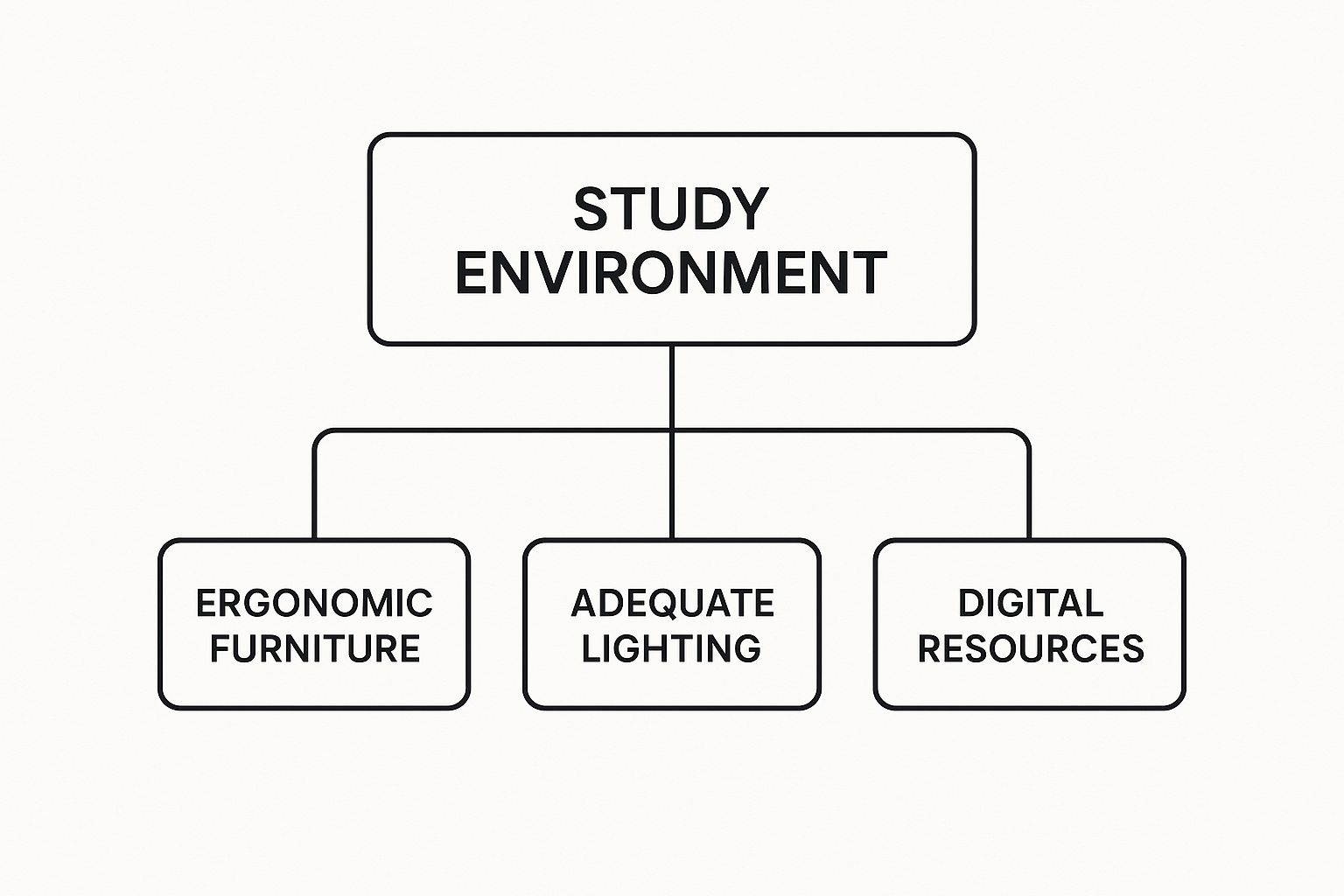Deciding to home educate for A-Levels is a deeply personal choice, one that puts your child's well-being and future back into your hands. It's about stepping away from a system that might not see them and creating a learning journey that honours their unique spark, their strengths, and their dreams. This guide is here to hold your hand through the process, showing you how this brave choice can lead to incredible academic success and personal growth.
Why More Families Are Choosing Home Education for A Levels
The move to home educate for A-Levels often starts with a quiet, persistent feeling that your child deserves something different. Perhaps you've watched their light dim in a bustling classroom, their natural curiosity overshadowed by the relentless pressure of exams. Or maybe they have a burning passion—for marine biology, for creative writing, for ethical hacking—that a rigid school timetable simply cannot accommodate.
This is about putting your child back at the very heart of their own education.
It's an emotional journey shared by a growing number of families. Recent figures show around 111,700 children were registered as electively home educated, a significant 21.4% increase from the year before. This isn't just a trend; it's a powerful statement from parents who are seeking an educational path that truly nurtures their child's spirit and potential.
Tailoring Education to the Individual
Imagine your child, an aspiring architect, being able to spend an entire day sketching designs and mastering complex software, completely absorbed and uninterrupted by a school bell. Think of a future musician able to dedicate their mornings to practice, fitting their academic study around their true calling. This is the beautiful reality of home-educating for A-Levels.
"Home education isn't about replicating school at the kitchen table. It's about dismantling the very idea of 'school' and rebuilding it piece by piece around the unique soul of your child, their passions, and their aspirations."
This approach gives you the freedom to:
- Focus on Strengths: You can pour time and resources into the subjects where your child truly comes alive, helping them build not just knowledge, but a deep and lasting confidence.
- Support Challenges: It allows for patient, one-on-one attention on topics they find difficult, using creative methods that click with their way of thinking instead of causing frustration.
- Foster Well-being: You can craft a calm, safe learning space, a sanctuary from the social pressures or anxieties that can make the A-Level years so overwhelming for many teenagers.
By choosing this path, you aren't just selecting a different educational method. You are making a heartfelt choice to see, hear, and nurture your child for exactly who they are. For those just beginning to explore this possibility, our complete guide to online home education in the UK offers a warm and welcoming starting point.
Understanding Your Legal Responsibilities
Navigating the legal side of home education can feel daunting, sparking anxieties about getting it 'right'. But the truth is much more empowering. In the UK, it is your fundamental legal right to educate your child at home—a right designed to place your child’s needs firmly back in your hands. This freedom is the bedrock upon which you can build a truly personalised A-Level experience.

This journey starts with understanding one key phrase from the Education Act 1996: parents are responsible for ensuring their child receives a "suitable" education. That one word, "suitable," can cause a lot of worry, but its flexibility is its greatest strength. It gives you the power to create an education that truly fits your child, rather than asking them to shrink to fit a pre-made system.
What Is a "Suitable Education"?
So, what does "suitable" really mean for your child? It absolutely isn't about recreating a school timetable on your kitchen wall. The law defines it as an education that is appropriate for your child's age, ability, aptitude, and any special educational needs they may have.
In essence, it must prepare them for life in modern society. For A-Levels, this means creating an educational experience that helps them reach their unique goals, whether that's a place at their dream university, a competitive apprenticeship, or launching their own business.
Crucially, you are not legally required to:
- Follow the National Curriculum.
- Stick to specific school hours or terms.
- Have a formal teaching qualification.
- Give your child formal lessons every single day.
This legal freedom allows you to tailor the home education A-Levels experience completely to your child's needs. If your child is a future scientist who learns best by spending three full days on a single biology experiment, they can. If your creative artist needs to visit galleries and draw from life to feel inspired, that is their "suitable education."
The law trusts you, as the parent, to know what is best for your child. It focuses on the outcome—a well-prepared, thriving young adult—not on forcing you to follow a rigid, school-based process to get there.
De-Registering from School: The Practical Steps
If your child is currently at a mainstream school (this doesn't apply to special schools), the process of withdrawing them is often much simpler than you might fear. All it takes is a formal letter to the headteacher, stating your intention to de-register your child to provide elective home education.
Your de-registration letter should be clear and concise. It only needs to include:
- Your child’s full name and date of birth.
- A clear statement that you are withdrawing them from the school roll.
- The date from which they will be educated at home.
- Your name and signature.
Once the school receives this letter, they are legally obligated to remove your child from their roll and inform the Local Authority (LA). You do not need their permission.
It's natural to feel your heart beat a little faster as you send that letter; it's a huge emotional step. Remind yourself that you are taking this brave action to create a better, more supportive learning environment for your child.
Communicating with Your Local Authority
After de-registering, your Local Authority may make what they call an ‘informal enquiry’. While they have a duty to ensure children are receiving a suitable education, their powers are limited. You are not required to allow home visits or provide evidence in a format they dictate.
Many families find it helpful to provide a brief report or an educational philosophy that outlines their approach to their child's home education A-Levels programme. This is a chance to share your vision, showing you have a thoughtful plan that centres on your child’s needs. This often satisfies enquiries without feeling intrusive.
Understanding your rights here is key. It empowers you to build a confident, cooperative relationship with the authorities on your own terms, protecting your family’s privacy while honouring your legal duties.
Designing a Custom A Level Curriculum
This is where the heart of home education truly beats. You have the incredible opportunity to step away from the rigid, one-size-fits-all school model and become the architect of an A-Level experience that connects with your child’s soul, their learning style, and their future dreams. This isn’t about ticking boxes; it's about igniting a genuine, lifelong love for learning.
Imagine your teenager, an aspiring game developer, feeling utterly deflated by a standard school curriculum. At home, you can build a programme that speaks their language. They could combine Maths, Computer Science, and Art, using practical tools like online coding platforms and digital art tutorials to build a real portfolio. Their learning becomes a project with purpose, driven by their own ambition.
This is the emotional core of choosing home education for A-Levels—that profound joy of watching your child finally light up because their education is a true reflection of who they are and who they want to become.
Choosing the Right Subjects and Exam Boards
The first step is a conversation about the subjects that will form the foundation of their future. This should be a collaborative, exciting process, guided by their interests and university or career aspirations. Once you have a shortlist, the next practical step is choosing an examination board for each subject.
The main exam boards for A-Levels in the UK are:
- AQA (Assessment and Qualifications Alliance): Known for clear specifications and fantastic support resources for private candidates.
- Pearson Edexcel: A popular choice offering a vast range of subjects and International A-Levels (IALs), which can provide more flexible exam timings.
- OCR (Oxford, Cambridge and RSA Examinations): Offers a variety of A-Level qualifications, often praised for its creative approaches to certain subjects.
Each board has a slightly different syllabus and assessment style. It's essential to visit their websites together, download the subject specifications, and see which one feels like the best fit for how your child learns. Does the essay style suit them? Do the set texts excite them?
Here’s a look at the AQA website, which clearly lays out the subjects they offer.

This just goes to show the breadth of options available, allowing you to find the perfect match for your child's academic and career aspirations.
Gathering Your Learning Resources
With subjects and exam boards chosen, the fun begins: assembling the tools for their learning adventure. The beauty of home education A-Levels lies in the rich tapestry of resources available far beyond a single textbook. Your role evolves from teacher to learning facilitator, curating the best materials to spark your child's curiosity.
You are not just managing their education; you are creating an ecosystem of learning where their mind can flourish. This personalised approach is your family's greatest strength.
Think about creating a blend of resources to keep learning dynamic. For example, a student studying A-Level History could learn through:
- Core Textbooks: Using the official, board-endorsed textbooks to cover the essential syllabus content.
- Primary Sources: Analysing historical documents from online archives—imagine them reading a soldier's actual letter from the trenches.
- Academic Lectures: Watching university-level lectures on YouTube to hear passionate experts discuss their field.
- Documentaries: Using powerful documentaries to bring historical periods to life, making it feel real and immediate.
This multi-faceted approach helps them develop critical thinking skills and a much deeper understanding than rote learning ever could.
Structuring the Learning Environment
Creating a physical space dedicated to learning is a vital part of designing their curriculum. A successful home study environment is built on a few key pillars that support both their well-being and academic focus.
The image below illustrates the essential components of an effective home learning space.

This visual highlights that a productive study environment is a deliberate act of care, combining physical comfort with the necessary tools for modern learning. By investing thought into their workspace, you send a powerful message that their education, and their future, matters deeply. Building a bespoke curriculum is an act of profound love, empowering your child to take ownership of their dreams.
Navigating A-Level Exams as a Private Candidate
After all the hard work, the dedicated study, and the joy of personalised learning, the final exams can feel like the biggest and most intimidating hurdle. This is the moment your family's unique educational world meets the formal, official system. It’s natural to feel a little anxious, but with forward planning, this process is entirely manageable and your child will be more than ready.

As a home-educated student, your child will sit their exams as a private candidate. This simply means they’ll register with an approved exam centre to take the very same exams as their school-based peers, having prepared for them independently. The exam centre is just a neutral venue providing the formal setting required by the exam board.
Your child's performance is measured against the exact same national standards as every other student. For context, recent national data for England showed that 77.7% of A-Level grades awarded were C or above. You can discover more insights about these A-Level trends on schoolsweek.co.uk.
Finding and Registering with an Exam Centre
Finding a centre that accepts private candidates requires a little legwork, as not all schools and colleges offer this service. Securing that exam place, however, is a huge milestone; it makes the A-Level goal feel tangible and real, bringing a rush of accomplishment for both you and your child.
Here’s a practical action plan to get you started:
- Start Early: Please don’t leave this to the last minute. Begin your search at least a year before the exams. Centres have limited spaces, and deadlines often fall in the autumn for the following summer's exams.
- Use Exam Board Search Tools: The major exam boards like AQA and Pearson Edexcel have useful search tools on their websites to help you find approved centres in your local area.
- Contact Centres Directly: Make a list of local schools and colleges and call them. Ask for the Exams Officer and be direct: "Do you accept private candidates for A-Level [Subject Name] with the [Exam Board Name] exam board?"
- Confirm the Costs: Fees can vary significantly. You'll pay the exam board's entry fee plus an administration fee charged by the centre. Expect this to be between £150 and £300 per subject, but always get a clear, itemised quote in writing.
What About Subjects with Practical Components?
Subjects like Biology, Chemistry, Physics, and Art have an extra layer of complexity: the Non-Exam Assessment (NEA) or practical endorsement. This is where your child’s hands-on skills are formally assessed, which can be a wonderfully engaging part of their learning.
The key is to find a centre that not only lets your child sit the written papers but also has the facilities and staff to oversee their practical assessments. This often means focusing your search on larger colleges or dedicated private exam centres.
When you contact a potential centre for a science subject, you need to ask some very specific questions:
- Do you offer the full practical endorsement course for private candidates?
- What is the schedule for these lab sessions?
- What are the total costs, including lab access, materials, and the assessment itself?
For a child who loves science, completing these practicals is an incredibly rewarding experience. It's where the textbook theories burst into life. Finding the right centre is the crucial step that makes this possible. For more detailed guidance, this guide to online A-Levels in the UK offers some really helpful perspectives.
Preparing for the Exam Hall Experience
Perhaps the most important part of this process is emotionally preparing your child for the exam environment. After learning in the comfort and familiarity of home, the silent, formal atmosphere of an exam hall can be a shock to the system.
Talk openly about what it will feel like: the rows of desks, the invigilators, the intense silence. A great practical tip is to run mock exams at home under strict, timed conditions. No interruptions, no music, just the clock ticking. This builds a sense of familiarity and helps manage any rising anxiety.
The goal is for them to walk into that hall feeling calm, prepared, and empowered. You want them to know, deep down, that their unique home education A-Levels journey has equipped them perfectly for this final step.
Building a Supportive Learning Environment at Home
A successful A-Level journey is built on far more than just academics. It's about creating a nurturing home environment where your child feels safe, seen, and supported, both emotionally and mentally. This loving foundation is what allows academic success to blossom, ensuring they can tackle the rigours of their studies with resilience and balance.

This means shifting your focus from simply managing their education to actively championing their well-being. It’s about recognising that a teenager’s ability to learn is deeply connected to their happiness and sense of self-worth. By intentionally designing a supportive atmosphere, you empower them not just as a student, but as a whole person ready to step into their future.
Crafting a Dedicated Learning Space
The physical environment sends a powerful, unspoken message. A dedicated study space, however small, signals that their home education A-levels are important. It provides a sanctuary where they can switch into "study mode," leaving the distractions of daily life behind to achieve deep focus.
This doesn't require a separate home office. It could be a quiet corner of a room or a well-organised desk in their bedroom.
The key is purpose. For example, a student immersing themselves in English Literature might have a comfortable chair, good lighting, a bookshelf for their novels and poetry, and a pinboard for character maps. This simple, personalised setup helps them feel completely absorbed in their subject, making learning a more joyful experience.
Establishing a Rhythm, Not a Rigid Routine
One of the greatest gifts of home education is freeing your child from the tyranny of the school bell. You can create a daily rhythm that respects their natural energy cycles and learning preferences. This is about building discipline through structure and trust, not control.
For instance, a 'night owl' who finds early mornings a struggle could begin their focused academic work at 10 am after some fresh air, breaking for a late lunch before a final study session. This flexible approach prevents burnout and teaches them invaluable life skills in managing their time based on their own internal clock—a skill many adults still struggle with!
A supportive learning rhythm values deep work over "busyness." It’s about trusting your child to manage their own time, fostering an independence that universities and employers prize so highly.
This approach builds a profound sense of ownership. When a student feels trusted and in control of their schedule, their motivation skyrockets. Their studies transform from a list of tasks into a personal project they genuinely care about.
Tackling the Socialisation Myth Head-On
The question of socialisation is often the biggest worry for parents considering home education. The truth is, home education can offer opportunities for deeper, more authentic social connections than a crowded school environment ever could. It’s about the quality of interactions, not just the quantity of people in a room.
Think beyond the school gates. Social confidence thrives when teenagers connect with others over shared passions. You can actively nurture this by encouraging them to:
- Join Specialised Clubs: This could be a local robotics club, a debating society, or a young writers' group, connecting them with kindred spirits who share their spark.
- Volunteer for a Cause: Working with a local charity or animal shelter teaches empathy and responsibility, allowing them to interact meaningfully with people from all walks of life.
- Connect with Local Networks: Many areas have vibrant home education communities that organise teen meet-ups, group study sessions, and social events where they can find their tribe.
For example, an aspiring medic could volunteer at a care home, gaining invaluable real-world experience while building social confidence. This type of interaction is far more formative than sitting in a noisy common room. It ensures that when they complete their home education A-levels, they are not only academically brilliant but also socially mature and ready for their next adventure.
Planning for University and Beyond
Completing A-Levels at home is a monumental achievement, a testament to your child’s dedication and your family's belief in a different path. But the journey doesn't end with the final exam. The next chapter—be it university, an apprenticeship, or diving into a career—is where their unique educational story truly begins to shine. Now is the time to translate all that hard-earned knowledge and independent spirit into an application that celebrates their journey.
For most, this means engaging with the Universities and Colleges Admissions Service, or UCAS. This is the central gateway for nearly all UK university applications.
Here's a look at the UCAS homepage, which will likely become a familiar and helpful resource.
The entire platform is designed to guide students through every step, from exploring courses that excite them to finally hitting ‘submit’ on their application. It’s an indispensable tool for every family navigating this important transition.
Crafting a Standout Personal Statement
For your home-educated child, the personal statement is their superpower. It's their chance to tell their unique story and frame their home education A-Levels experience not as an oddity, but as a distinct advantage. Admissions tutors are looking for self-motivated, curious, and resilient individuals—the very qualities that home education nurtures.
Encourage your child to tell the story behind their learning.
- Highlight Self-Discipline: They can describe how they designed their own revision timetable or managed long-term projects without constant supervision. A practical example, like creating a six-month revision plan for their exams, is incredibly powerful.
- Showcase Passion: Did their A-Level in History inspire them to volunteer at a local museum? Did their love for Biology lead them to start a wildlife blog? These are the stories that show genuine intellectual curiosity far beyond the syllabus. A budding historian who spent weekends digging through local archives to understand a topic has a much more compelling story than someone who simply says they "enjoy history."
"Admissions tutors aren't just looking for good grades; they're looking for an interesting mind. Home education often produces exactly that—a student who has learned how to think for themselves, pursue their interests, and take true ownership of their learning."
Securing an Academic Reference
One of the most common anxieties for home-educating families is the academic reference. "Who can write one if my child isn't at school?" you might wonder. Fortunately, UCAS provides clear guidelines specifically for home-educated applicants, and it's very manageable.
The reference should come from an impartial professional who can speak to your child's academic abilities. This could be:
- An online tutor from an accredited school.
- A subject-matter expert who has mentored them, perhaps a retired teacher or university student.
- The Exams Officer at the centre where they are registered as a private candidate.
The key is that the referee can vouch for your child's academic potential and suitability for higher education. It requires some forward planning, but it's a completely solvable part of the application puzzle. For more advice, exploring some essential tips on how to prepare for university can offer that extra layer of confidence.
Exploring All Future Pathways
While university is a wonderful goal, it's not the only path to a fulfilling future. The skills forged during home education—independence, problem-solving, drive—are highly valued everywhere. For the practical-minded child, a Higher Apprenticeship offers a brilliant route to a degree-level qualification while earning a salary and gaining real-world experience. It’s a perfect fit for a self-starter who thrives on hands-on learning.
Ultimately, whether they choose university, an apprenticeship, or entrepreneurship, their home education background is a powerful testament to their character. It shows the world they are not just ready for the future, but ready to create it.
Common Questions About Home Educating for A Levels
Thinking about home educating for A-Levels often brings a mix of excitement and, let's be honest, a few sleepless nights. It’s completely normal to have questions and worries as you consider what’s best for your child. Below, we’ve answered some of the most common queries with honesty and reassurance to help you feel confident on this journey.
How Much Does It Really Cost?
This is a huge question, but the answer is wonderfully flexible: it costs what you need it to cost. You are in complete control of the budget. One family might create an outstanding A-Level programme for their child using free library resources, past papers, and brilliant educational content on YouTube. Their only major cost would be the exam fees.
Another family might feel their child would thrive with more structure, choosing to invest in a comprehensive online course with live lessons and dedicated tutor support. There is no single "right" way to do it.
Your core expenses will almost always include:
- Exam Entry Fees: These are non-negotiable and are set by the exam boards.
- Exam Centre Admin Fees: The centre hosting your child for their exams will charge for their service.
- Curriculum Resources: This is the flexible part, ranging from buying a few key textbooks to a full online school subscription.
A practical way to begin is by budgeting for the exam and centre fees first, as these are your fixed costs. From there, you can build a resource plan that fits your family’s finances and, most importantly, your child's specific learning needs and style.
Can My Child Get into a Top University?
Yes. Unquestionably, yes. This is perhaps the most persistent myth about home education, but it's one you can confidently dismiss. Top universities, including Russell Group institutions, are very familiar with home-educated applicants and welcome them. What they truly care about are excellent A-Level results, a palpable passion for the subject, and evidence of independent thought.
A UCAS personal statement that tells the compelling story of a home-educated journey—highlighting self-discipline, curiosity, and project management—can make your child's application far more memorable than one from a traditionally schooled peer.
Imagine a student applying for computer science who taught themselves Python to build a small app for a local charity. That practical story demonstrates initiative that goes far beyond simply completing a syllabus.
What if I Can't Teach a Difficult Subject?
This is a completely valid fear. Not many parents feel equipped to teach A-Level Further Maths or Chemistry, and that is perfectly okay! It’s vital to remember that your role is to be your child's learning facilitator, mentor, and biggest cheerleader—not a specialist in every single subject. You do not have to do this alone.
When you hit a subject that’s beyond your expertise, you simply bring in support. This could look like:
- Enrolling your child in a dedicated online A-Level course for that specific subject, taught by an expert.
- Hiring a specialist online tutor for focused, one-to-one help with tricky topics.
- Forming a study group with other local home-educating families where parents can share their strengths.
No one expects you to be an expert in everything. The home education community is incredibly supportive, and reaching out for help is a sign of strength that models great problem-solving for your child.
At Queens Online School, we provide the expert support you need for challenging A-Level subjects through live, interactive classes led by specialist teachers. Discover how our accredited online school can help your child achieve their academic goals by visiting us at https://queensonlineschool.com/.

